⏰Last Updated on 10/17/24
You’re ready to enter affiliate marketing and create your own program. If you do it right, this strategy will increase your sales and raise your brand awareness.
After launching an affiliate campaign through reliable affiliate marketing software, the next crucial step is finding the right affiliate marketers to partner with.
Who could your affiliates be? Have you considered collaborating with bloggers to promote your products?
Actually, bloggers are one of the most popular affiliate types. Teaming up with them can bring many outstanding benefits to your business and affiliate campaign.
In this article, we’ll explain why recruiting bloggers is essential, provide practical tips for finding the perfect ones, and discuss effective ways to reach out to them.
Explore our 7 smart tactics on how to find bloggers:
- Conduct a Google search
- Do a search on social media
- Search for sites mentioning your brand
- Follow blogs within your industry
- Discover blogger directories
- Join affiliate marketing networks
- Participate in industry events and conferences
Then, to ensure you’re working with the right bloggers, remember to evaluate the effectiveness of the promotional content they contribute to your program.
If you’re wondering how to monitor and measure bloggers’s results accurately, try to use UpPromote – the #1 Shopify affiliate software trusted by experts and 115,000+ global customers— to simplify your tasks.
Activate UpPromote’s robust settings to track bloggers’ performance with real-time analytics.
Why Should You Find Bloggers For Your Affiliate Program?
Bloggers are those running their own blogs and regularly publish content, such as articles, reviews, lists, infographics, or even videos.
Bloggers focus on what they would like to write about. Topics could be hobbies, personal experiences, or professional areas, such as finance, technology, or travel.
When joining an affiliate program, bloggers promote products by writing about them and strategically placing affiliate links throughout their blog posts.
The main reasons why you should recruit bloggers are as under:
Build brand awareness
Bloggers often have a loyal group of readers. Working with them allows you to introduce your products to an audience that may not have heard of your brand.
A truth you should know is that 70% of people would rather learn about a company through articles than advertisements (DemandMetric).
Boost sales and increase conversion rate
Many bloggers specialize in a specific industry, such as health, fitness, fashion, or tech. Their followers trust their expertise, making them perfect candidates for promoting products in that niche.
According to data from a Research Now study, nearly nine in 10 consumers (84%) make buying decisions after reading about a product or service on a blog. And in the U.S. market alone, around 61% of customers say they have bought an item based on a blog post.
Expand your promotion reach
Most bloggers don’t just write blog posts—they also promote their content across multiple social media platforms, such as Instagram, Facebook, Pinterest, and Twitter.
By doing this, bloggers can increase your brand’s exposure and help you tap into various social media networks, providing a broader reach.
Drive SEO and organic traffic to your website
Bloggers often link back to your site when they mention your brand or products. Backlinks from trusted blogs can improve your SEO ranking and increase traffic.
In fact, organic search drives 85.19% of all blog traffic (HubSpot). By collaborating with established bloggers who produce detailed, keyword-optimized content, you can enhance your chances of ranking higher for relevant search terms. This high-quality content not only boosts SEO but also continues to drive traffic and generate sales long after it’s published.
Provide high-quality and authentic content
With good storytelling skills, bloggers can naturally weave product promotions into their content through personal experiences.
They also provide detailed, in-depth reviews, much like Wirecutter. Wirecutter’s reviews are mostly in-depth, hands-on tested, and pitted against each other to assist the readers in making informed decisions while buying.
Well-crafted reviews like these have a great influence on the consumer. Products having five reviews are 270% more likely to be purchased than others without.
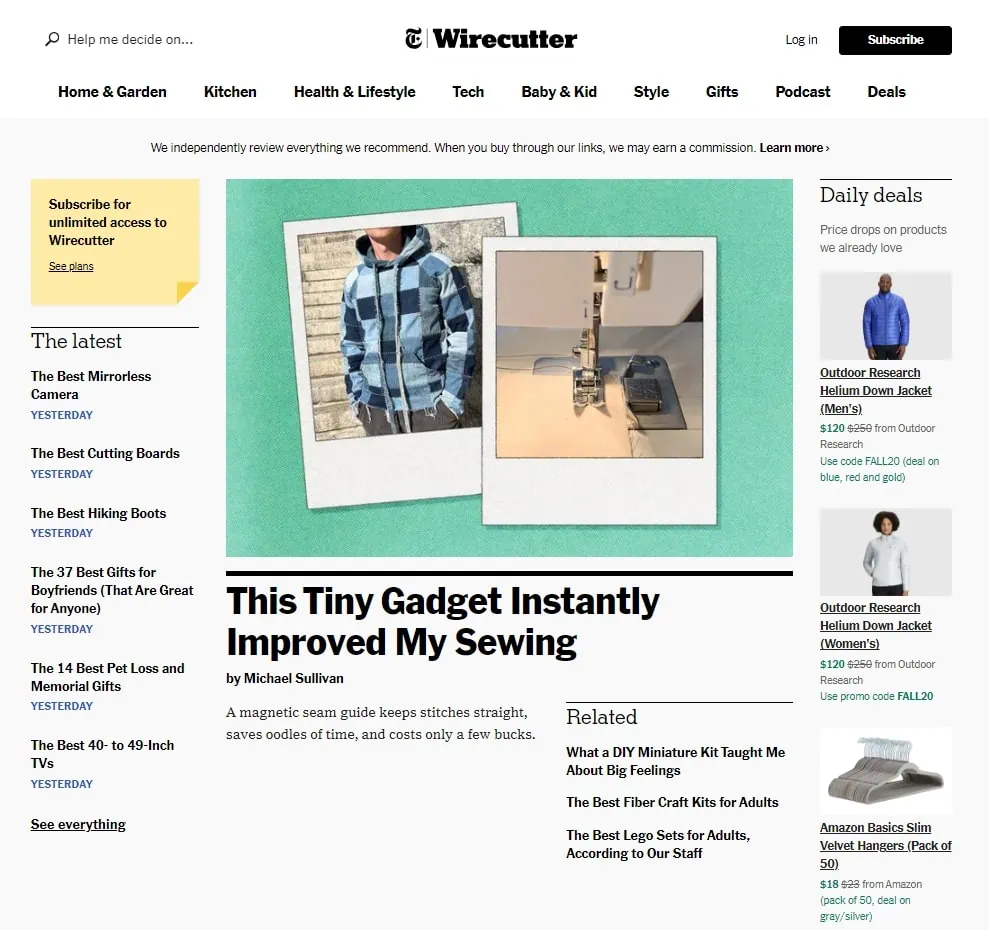
7 Tactics On How To Find Bloggers In Your Niche
Maybe you’re thinking about reaching out to bloggers in your niche and inviting them to join your program.
But how and where do you get started? The following are the ways:
1. Conduct a Google search
Start your search with the most popular search engine, Google.
You might think it is so simple. But this is actually the most effective way to find affiliates, including bloggers.
Use specific keywords
Start by listing down primary keywords related to your niche. Then, merge these keywords with terms like “blog,” “blogger,” “blogs,” or “review.”
Just enter these phrases as search queries, and you’re likely to get a list of top blogs and blogger round-up posts in your industry.
If you sell eco-friendly products, use keywords such as “eco-friendly lifestyle blog,” “green products blogger,” or “sustainable living blogger.”
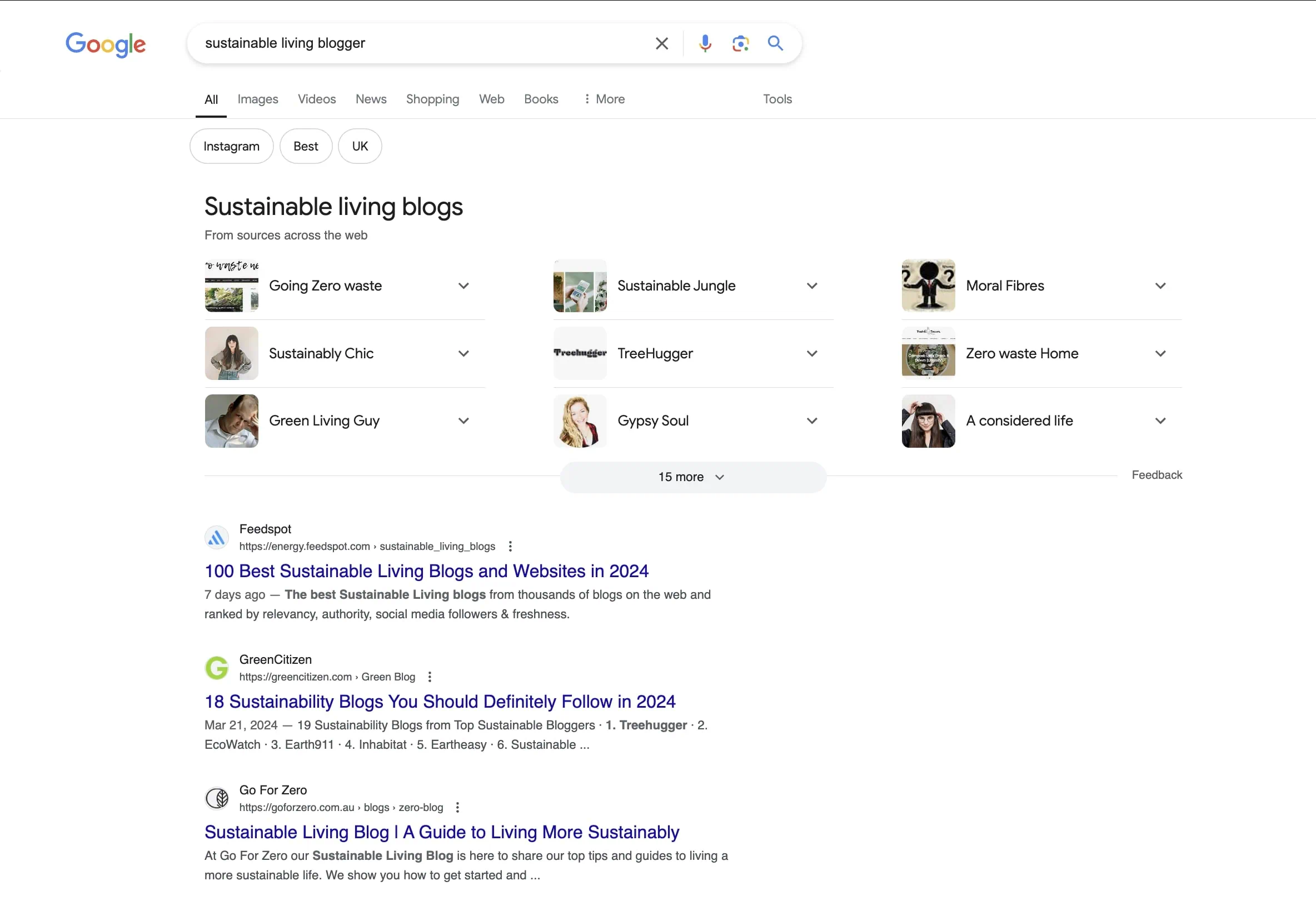
You can also search as follows:
- Top [your niche] bloggers
- Best [your niche] blogs
For example:
- Top 10 vegan food bloggers
- Best travel blogs 2024
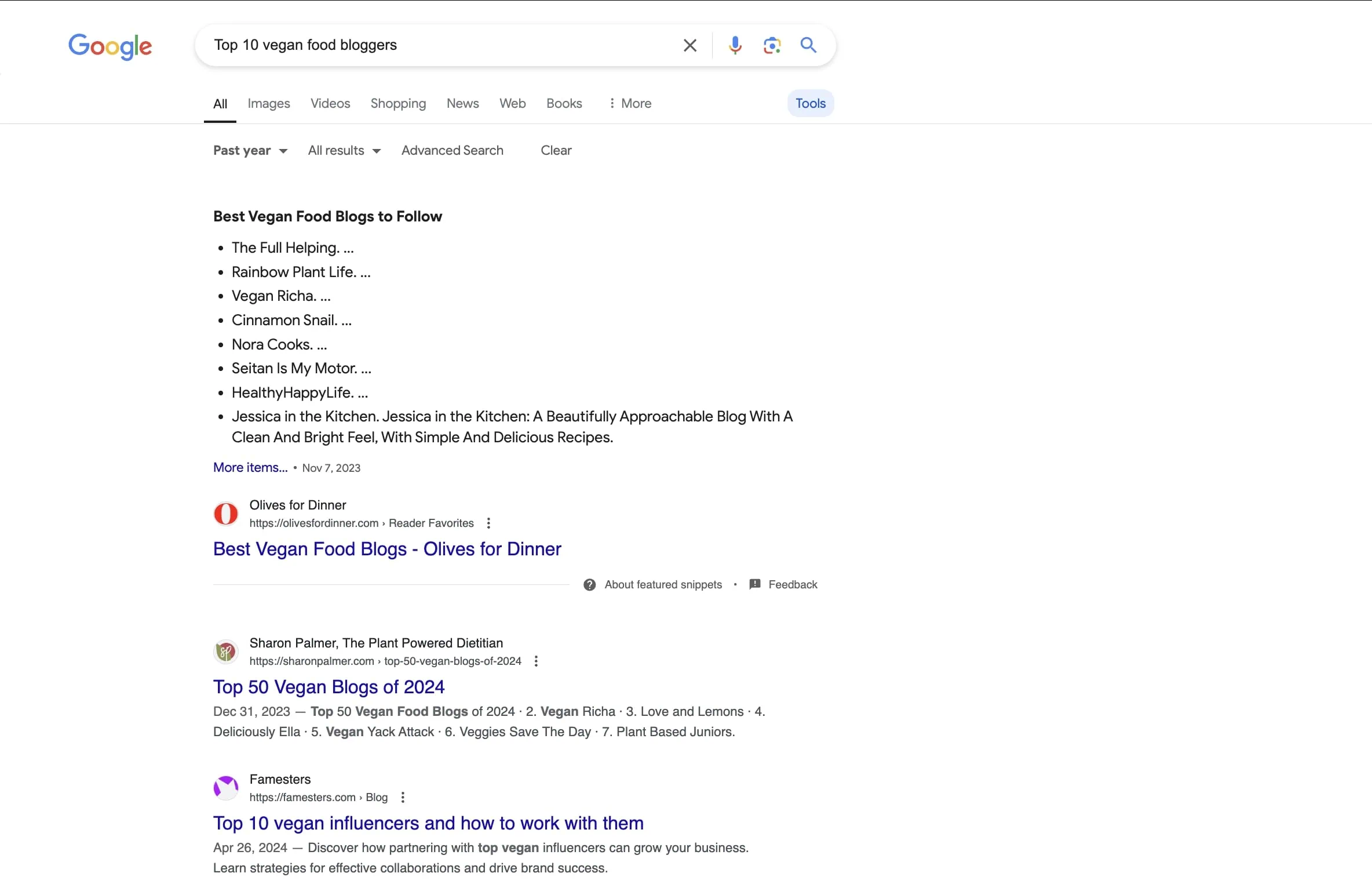
To ensure that you are finding bloggers who are currently active, use the date filter for results. Click on “Tools” under the search bar. Then, choose a time frame, such as the past month or past year, from the “Any time” dropdown menu.
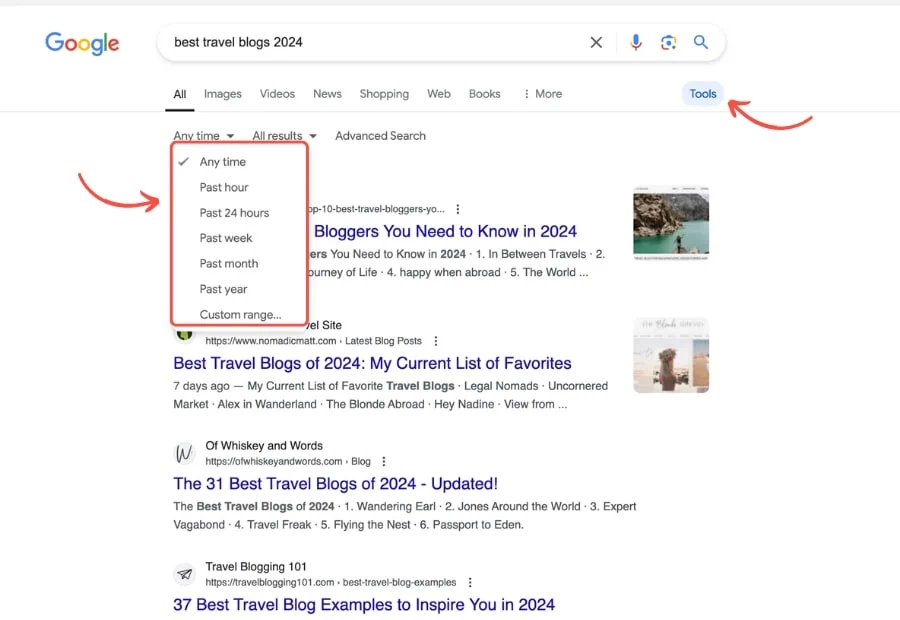
Utilize Advanced Search Operators
To narrow down your findings, try using Google search operators.
Here’s how to apply them to get better search results:
- Quotation marks
- Intitle
- Inurl
- Site Search
Quotation marks: Use quotation marks to search for an exact phrase. For instance, searching for “organic skincare blogger” will return results that match that term exactly.
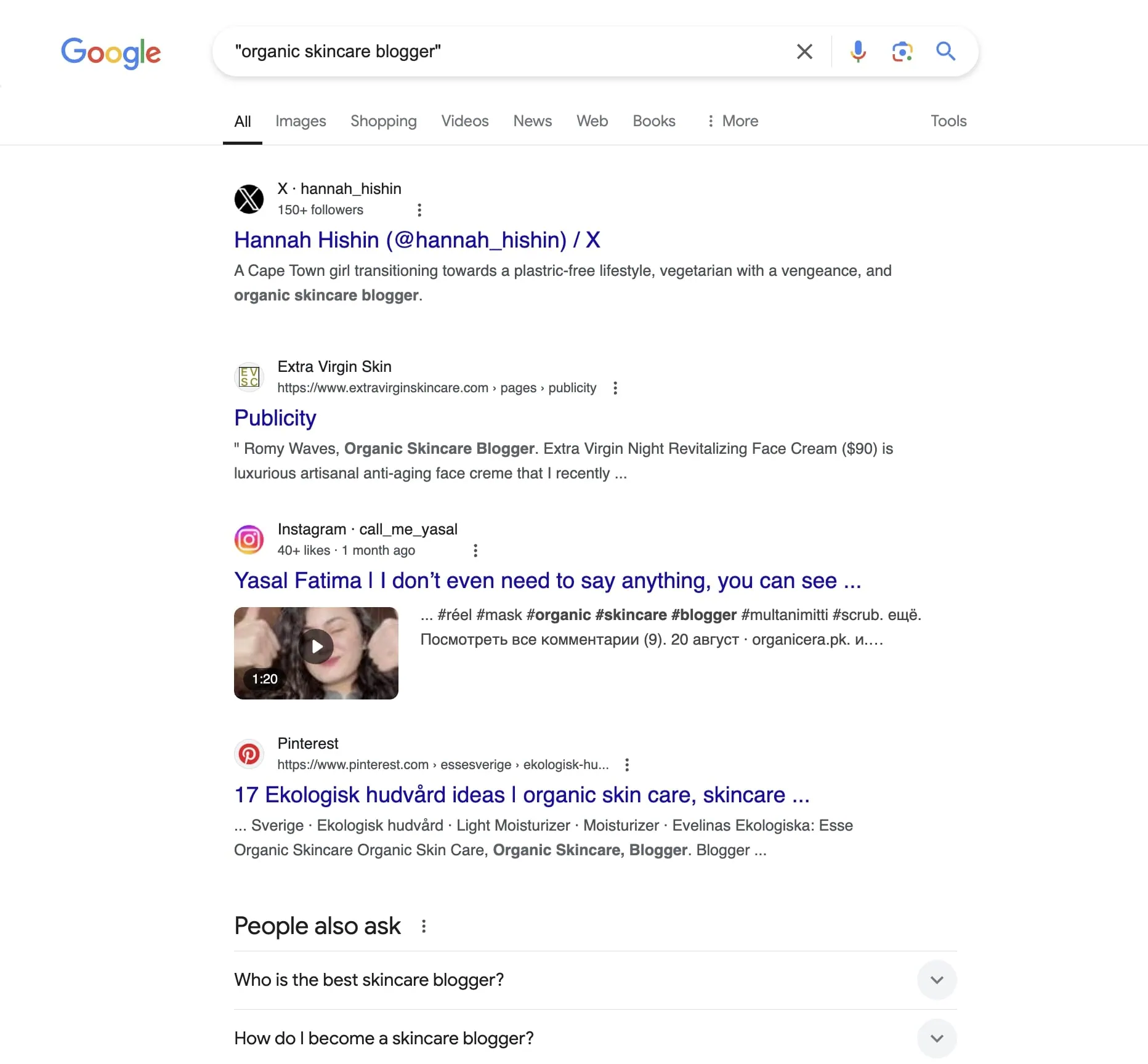
Intitle: You can find pages with specific words in the title. If you are looking for bloggers to sell fitness products, you can try to use intitle:”fitness blog”
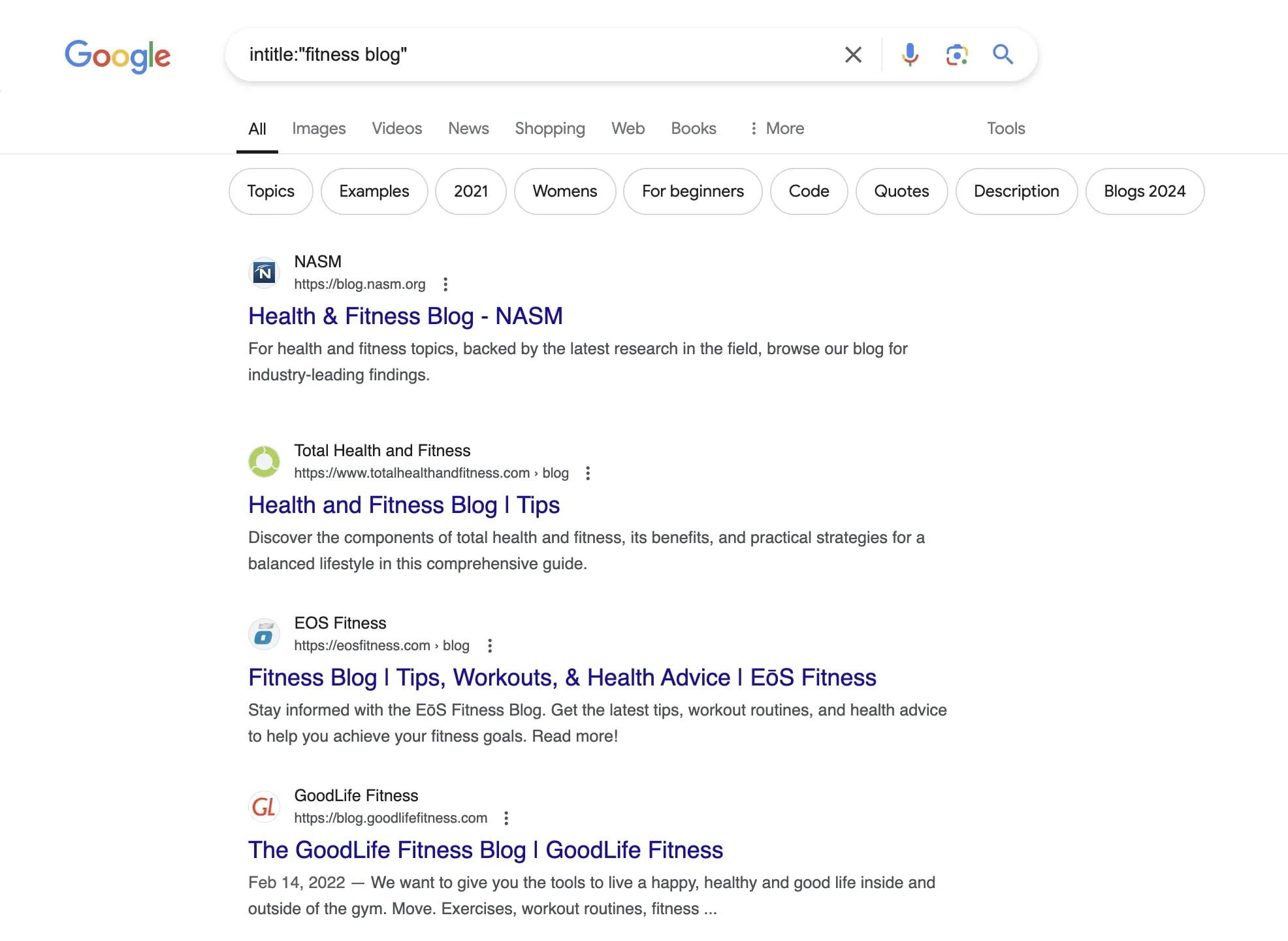
Inurl: This operator searches for specific words in the URL. If you’re running a parenting affiliate program, using inurl:blog “parenting advice” will help target blogs that have “parenting advice” in the URL.
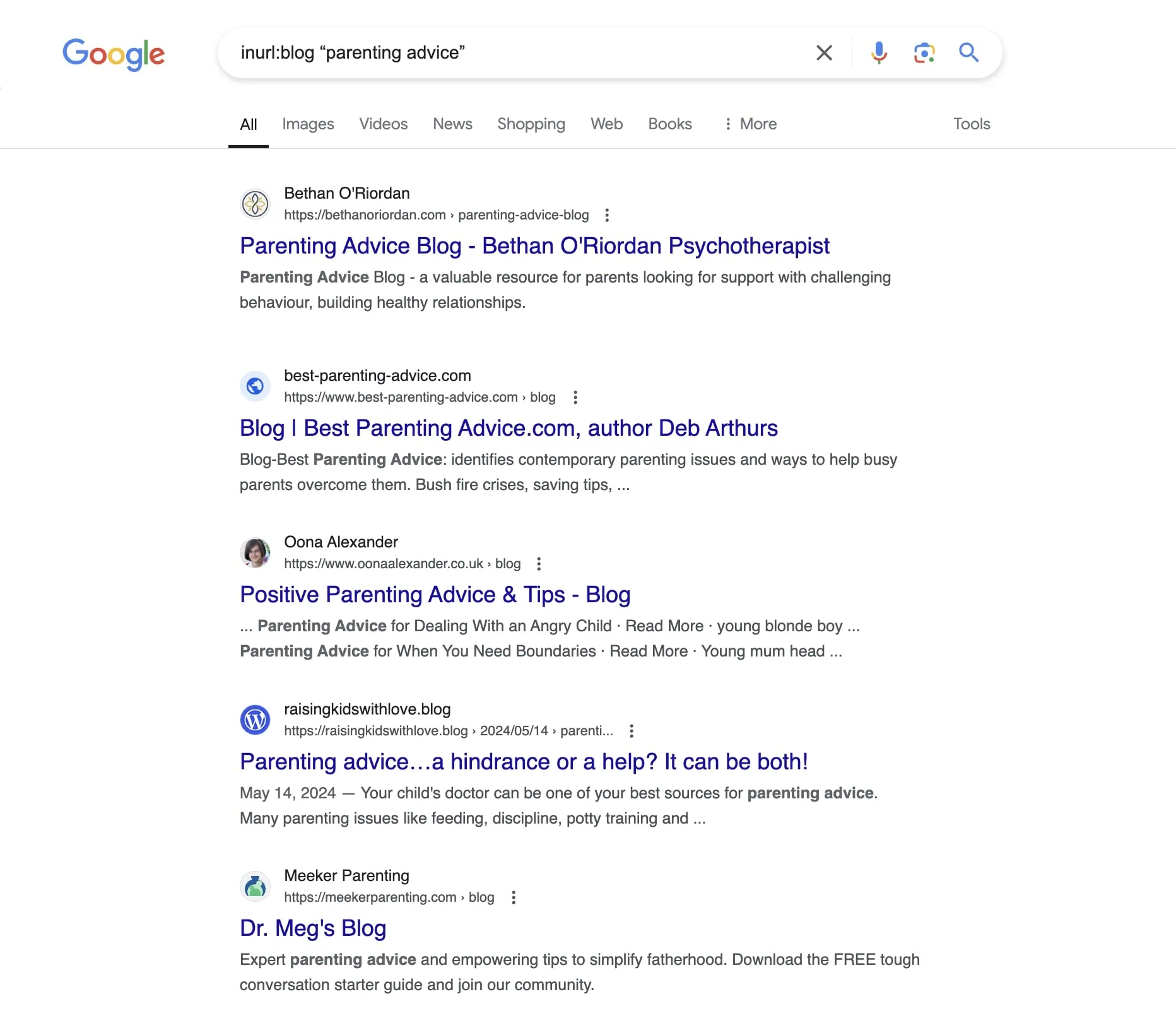
Site Search: Enables searching within a specific website or domain. For example, if you’re finding potential bloggers on Medium for your financial affiliate program, you can search site:medium.com “personal finance” to find relevant content.

2. Perform a search on social media
Few bloggers today stick to just their blogs. Rather, they also create profiles on social media platforms like Instagram, X (formerly Twitter), Pinterest, or YouTube to share their work and engage with audiences across multiple channels.
Therefore, another great idea is to take advantage of social media channels’ search functions to locate active bloggers in your industry.
You can try using some niche keywords, relevant hashtags, or phrases to refine your results.
Imagine that you’re running a tech and gadget store and looking for tech reviewers for your affiliate program.
One thing you can do is search for the keyword “tech blogger” or “tech review” on X. You’ll likely find many accounts with those terms in their bio or username.
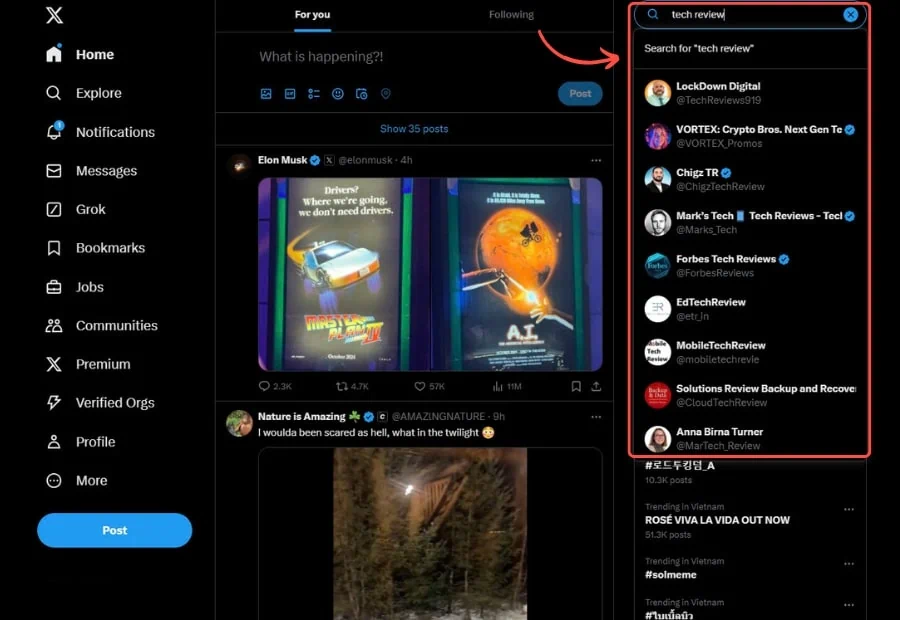
You can do the same thing on Instagram.
But it doesn’t stop there. You can also use hashtags, like #techreview or #techreviewer, to find potential bloggers who promote content on this platform.
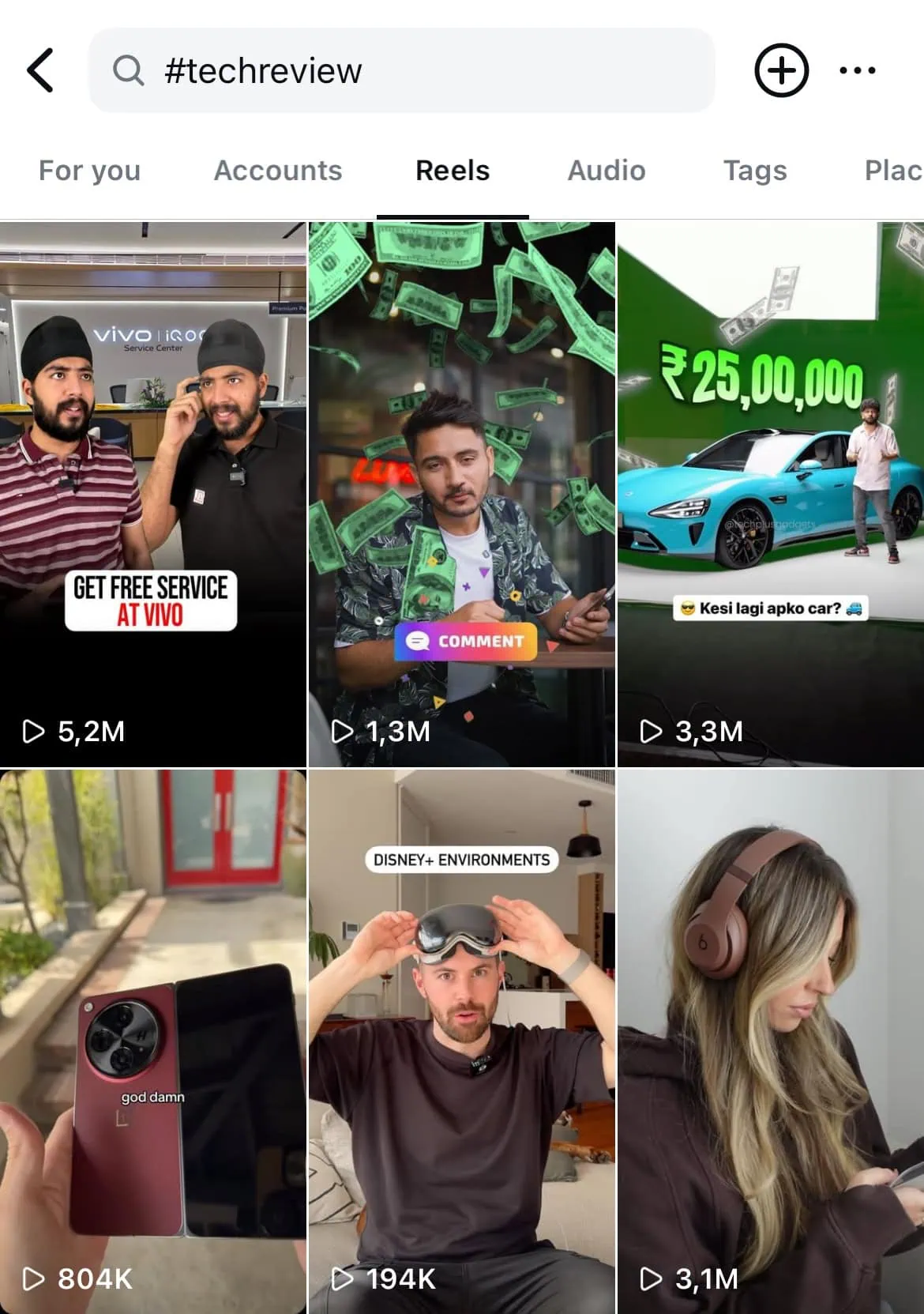
3. Look for sites mentioning your brand
Finding out who is talking about your business is important for managing your online reputation. It’s also a great way to find potential bloggers.
Bloggers might mention your business after trying your products or services. They could leave reviews on Google, post about it on social media, or write about your brand in their blogs.
When the feedback is good, you can actually get back to them regarding asking for collaboration and further spreading of the good word.
But how can you discover who is discussing your brand?
The answer is to use tools for monitoring brand mentions, for example:
Google Alerts
This is a free tool from Google that allows you to track mentions of your brand and related keywords. After setting up a Google Alert, you receive notifications whenever new content containing your chosen keywords is published online, such as news articles, blog posts, or web pages.
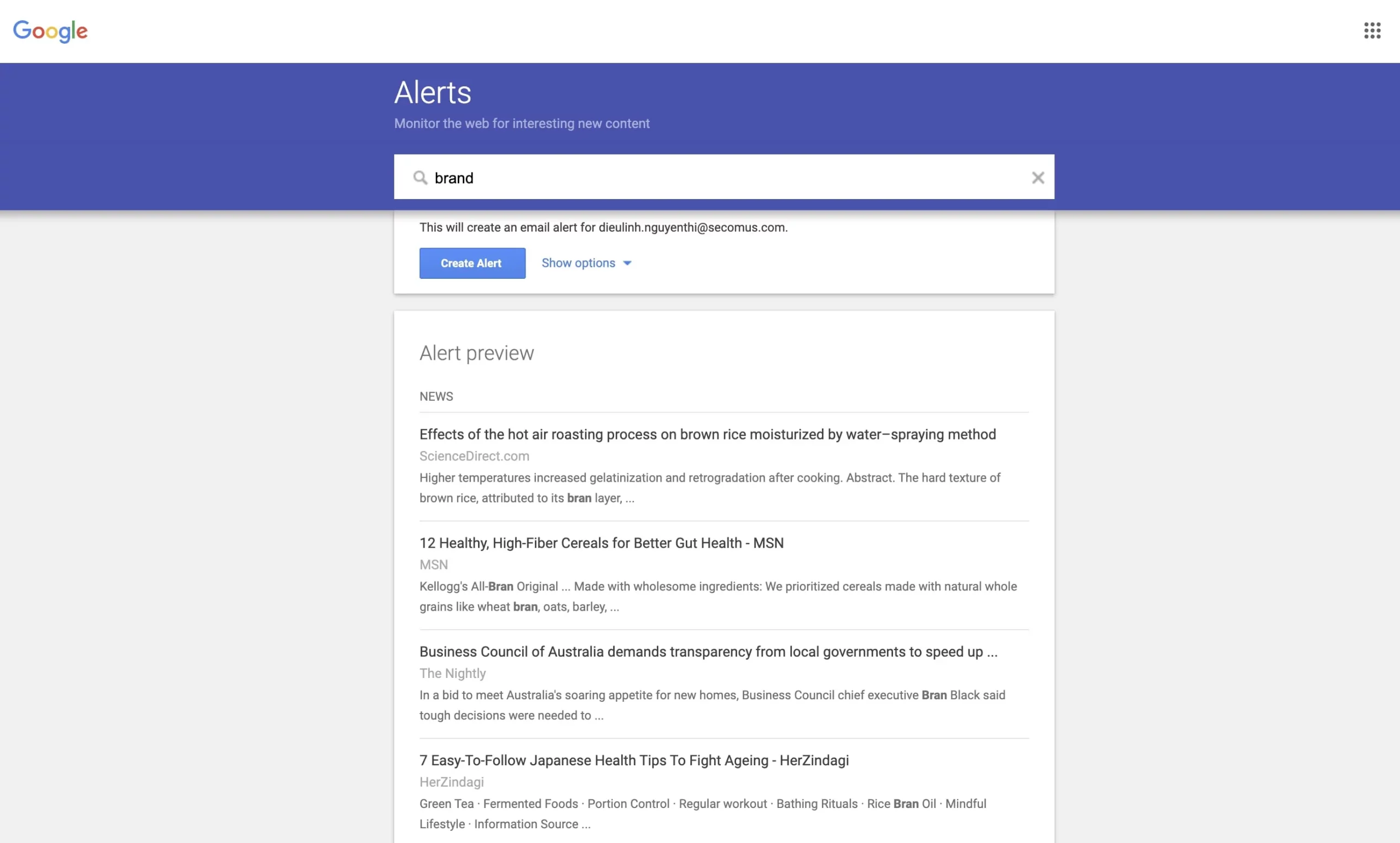
Social listening tools
Several social listening tools are available that help you track brand mentions across social media platforms, blogs, and news articles.
Some popular options include Brand24, Hootsuite, BuzzSumo, and Mention. With these tools, you’ll be able to find out who shares your content and talks about your brand. They even offer in-depth analytics on mentions.
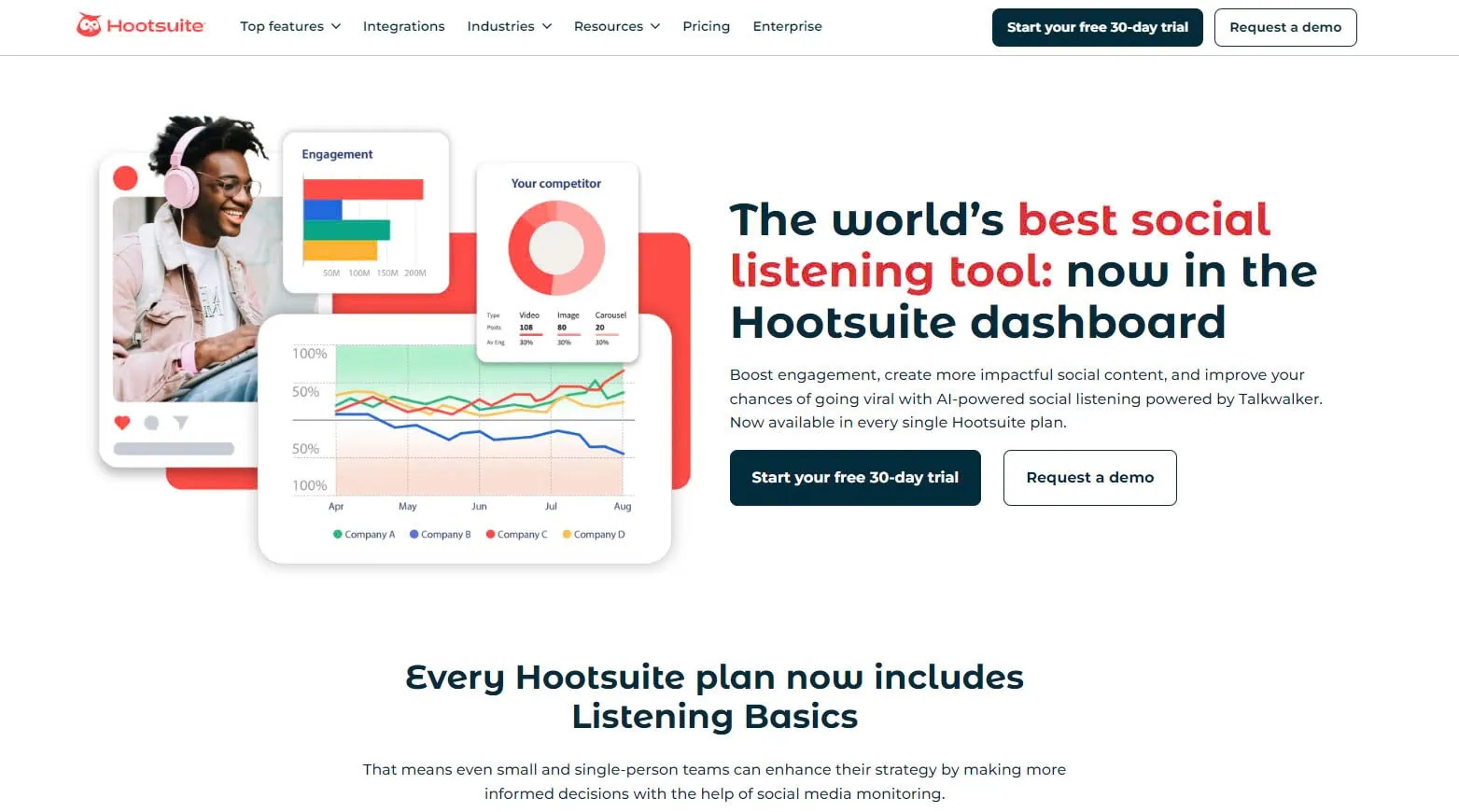
4. Follow your industry blogs
Don’t just think about reading and following blogs within your niche as a way to keep yourself updated with the market’s latest trends and best practices for growing your business. Actually, by doing that, you can identify high-quality bloggers to work with.
If you don’t know where to find your industry blogs, you can start with some well-known publishing platforms first, like Medium, Substack, or Patreon. Choose topics relevant to your niche, and these platforms will suggest top bloggers for you to follow.

5. Browse blogger directories
Blogger directories are online platforms that compile lists of blogs across various topics and industries.
Utilizing these directories can make it easier to discover blogs based on specific categories, keywords, or popularity.
Some popular directories to check out are Alltop, Bloglovin’, OnTopList, and Blogarama. Take a look through them, and you’ll likely find bloggers who are the perfect fit to promote your products.
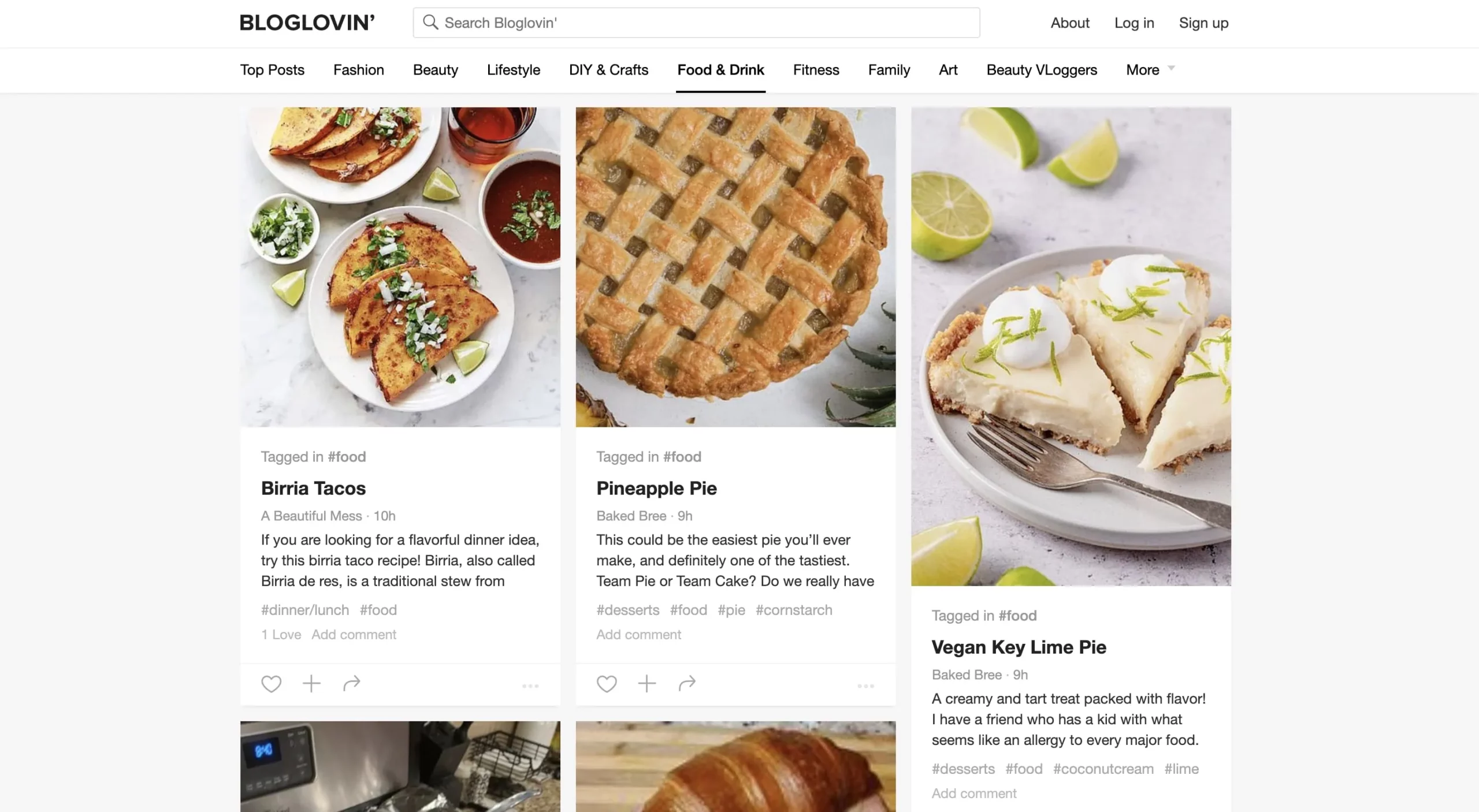
6. Leverage affiliate marketing networks
Another ideal resource to look for bloggers is to join affiliate networks, such as ShareASale, Clickbank, CJ Affiliate, Impact, and UpPromote Marketplace. These platforms provide you with access to connect with a large pool of potential publishers.
There are two things you could do with an affiliate network:
- Share your affiliate program details publicly with publishers who are seeking great collaboration opportunities
- Filter the affiliate list by your niche to find bloggers
That’s exactly what Tréskin, a favorite organic beauty brand in the USA, has done.
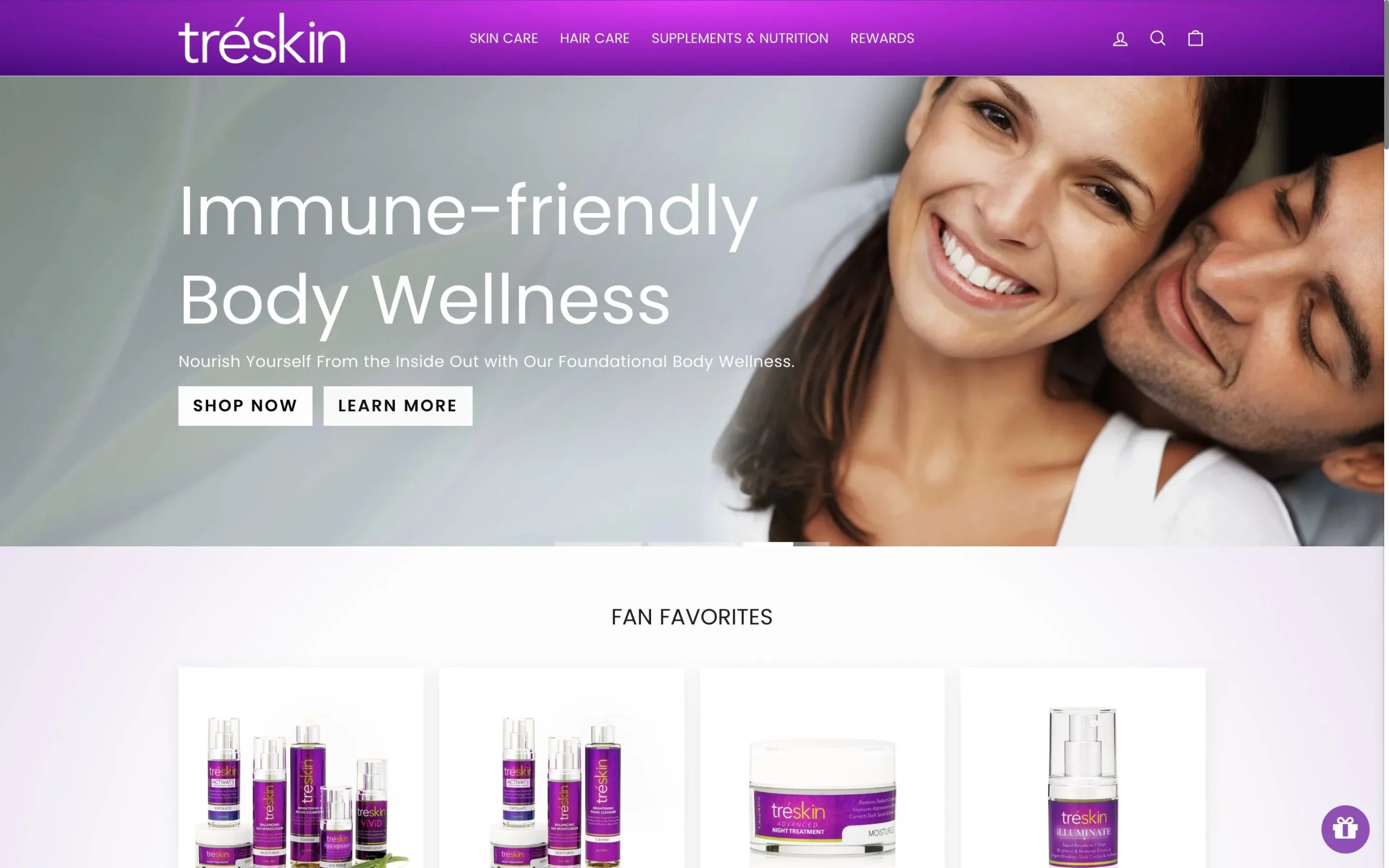
In addition to using UpPromote, the top recommended affiliate management software on Shopify, as a main solution to create, run, and manage affiliate programs, the brand also leverages UpPromote Marketplace to search for affiliate partners, including bloggers.
Tréskin doesn’t just list offers openly on the Marketplace. The brand also explores the beauty niche there to find top beauty bloggers and invites them to join its campaigns.
And the results? With a high-quality affiliate team, Tréskin reached impressive sales with more than $120,000 in affiliate revenue after a quarter of running a campaign via UpPromote.
Want to duplicate Tréskin’s success?
Discover top bloggers on UpPromote Marketplace today!
7. Attend industry events and conferences
Events and conferences related to affiliate marketing or your industry are great places to meet and network with bloggers.
Bloggers usually attend such events to share their working experiences, stay updated with the latest trends, and connect with peers and potential partners—and so do you.
With affiliate marketing, consider Affiliate Summit West/East, Affiliate Huddle, Affiliate World Dubai, etc.
Or, you can also check whether there are any upcoming specific-niche events to participate in. For example, if you’re looking for travel bloggers for your travel affiliate program, joining summits and conferences of Travel Blog Exchange (TBEX) can be a great opportunity.
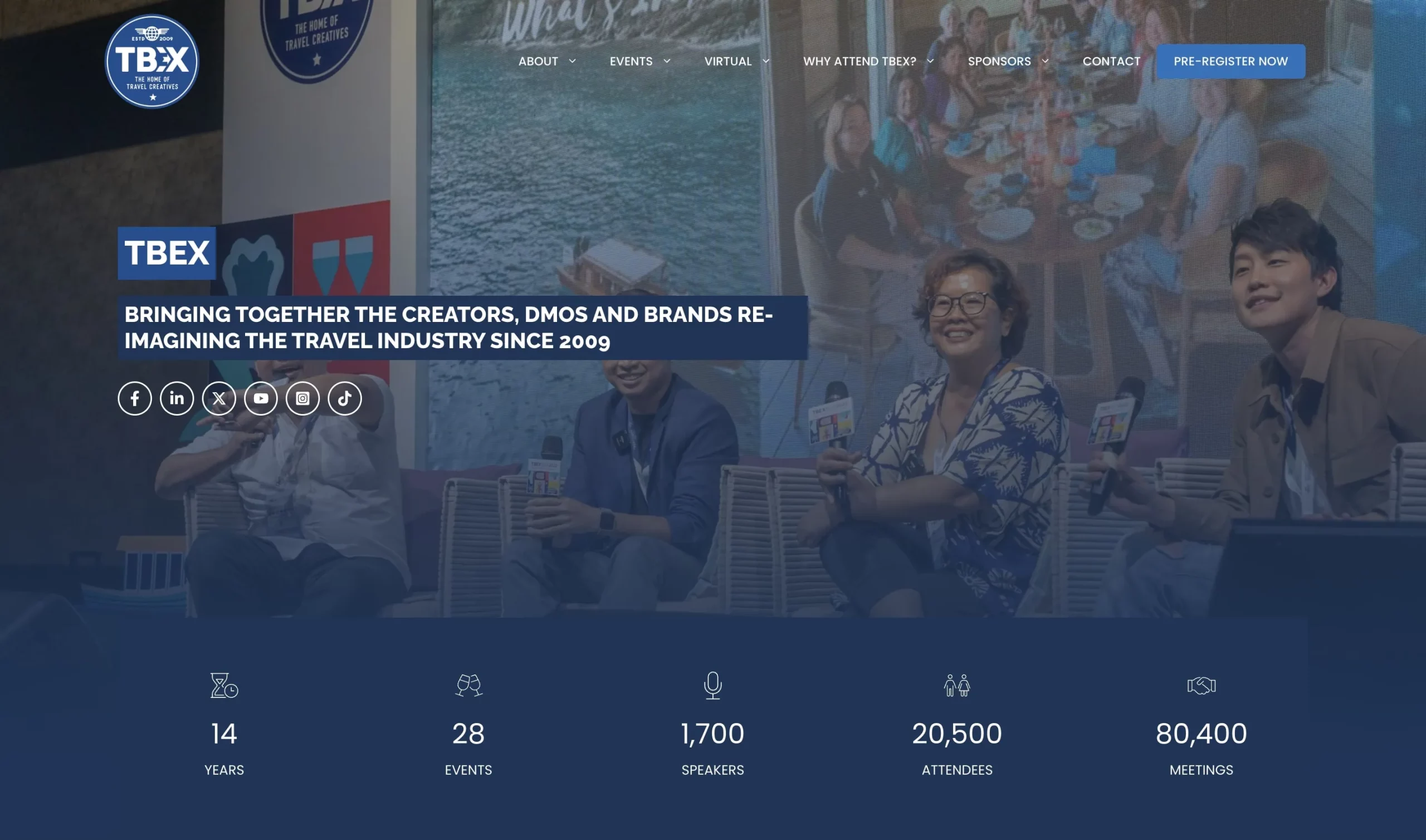
You might wonder how to find popular and reliable ones to join. Well, here it goes:
- Use keywords on Google like “[Your Industry] Conference”, “[Your Niche] Trade Show”, or “[Your Industry] Networking Events”.
- Visit websites like Eventbrite, Meetup, and Conference Alerts for event listings
- Check industry magazines and newsletters for upcoming events
Remember to check the fee of each event to set aside a budget for it. Some are free, while others require a ticket purchase.
Best Tips To Find The Right Bloggers For Your Business
Working with the right bloggers is key to campaign success. Great partnerships with them can amplify your brand’s reach, enhance credibility, and boost engagement and sales to your store.
To attract the perfect bloggers for promoting your products, take into account these things:
Determine your ideal blogger partners
To make your recruitment plan more effective, you need to identify the characteristics of bloggers who can best represent your brand.
Here’s what to think about:
- Niche relevance: Seasoned bloggers in your industry may understand your products better and will, therefore, have more to contribute in terms of valuable insights that enable them to make the promotional content more appealing.
- Target audience match: First, think about your target customer profile-their age, location, and interests. Then come bloggers whose audience actually matches yours.
- Quality of content: Assess whether the blogger’s style and tone match or should match your brand values and personality. Make certain they are capable of posting on a regular schedule and maintaining consistent themes.
- Engagement rate: Look for the number of followers/subscribers. Calculate likes, comments, shares, and views in relationship to follower count. Determine if the blogger responds back to comments and creates community engagement. These metrics indicate the following: The blogger and their audience are active and responsive.
For example, Glossier, a well-known beauty brand, regularly seeks out famous lifestyle influencers and beauty bloggers for collaborations.
These individuals love sharing skincare tips and makeup looks. They typically have a great built-in audience of around 100,000 subscribers/ followers on Youtube or other social media channels and receive an average of 2,000 – 3000 likes and around 200-300 comments per post.
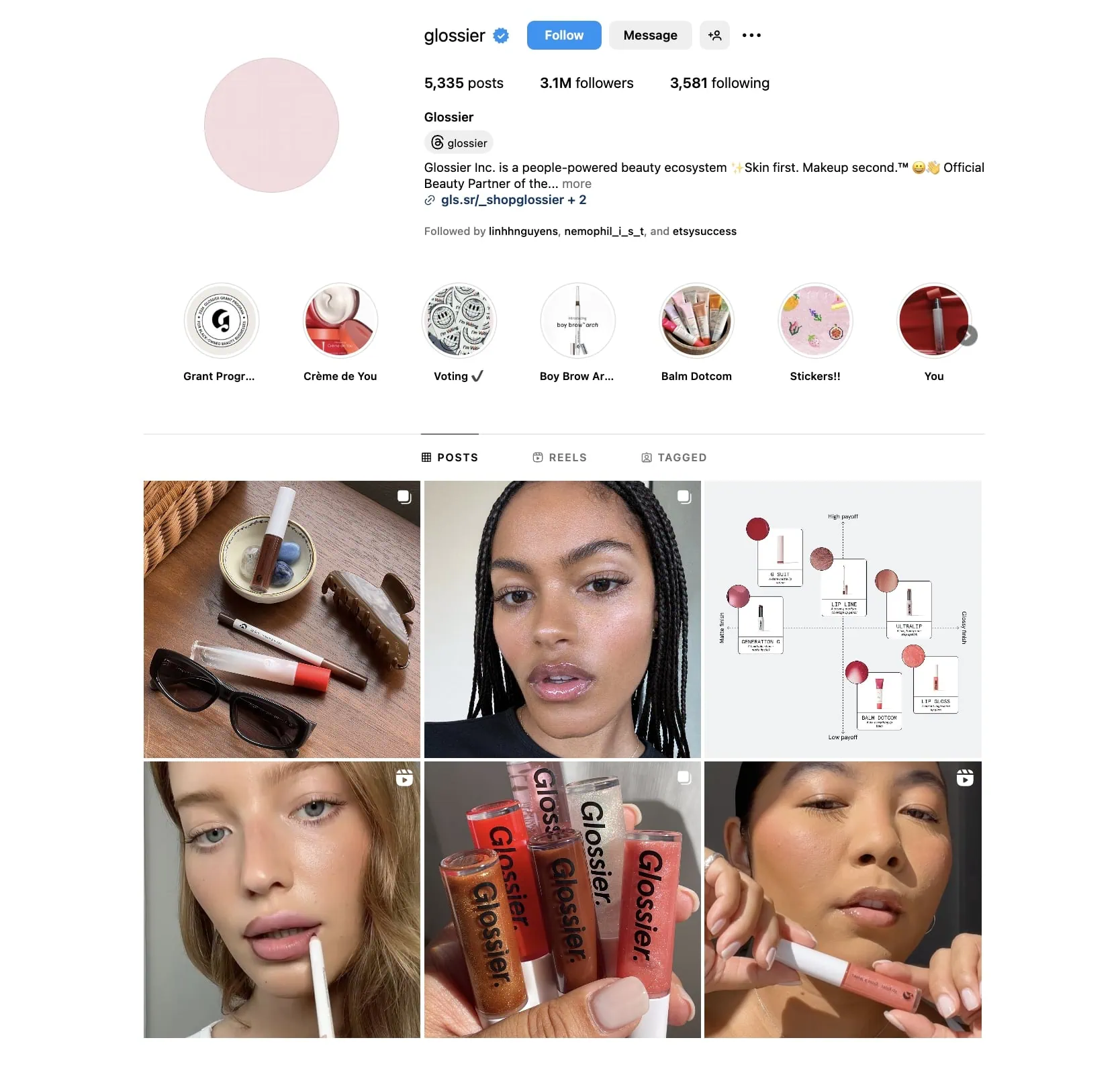 Offer competitive commission rates
Offer competitive commission rates
One of the main reasons bloggers—and other types of affiliates—partner with your brand is to earn commissions. So, ensure your commission offers are competitive to attract top bloggers to your program.
Check what other brands in your industry provide, and make sure that your commission rates are appealing compared to theirs. Discover the average rates in your niche before making a decision. For instance:
- Fashion: 5%–20%
- Electronics & Gadgets: 2%–8%
- Pets: 10%–20%
- Food & Drink: 10%–20%
- Beauty & Personal care: 5%–15%
Further, to make your offers stand out from competitors, consider off special bonuses or setting a tiered commission structure.
Once again, Tréskin is a great real-world example for you to check out.
Through UpPromote, the brand sets a special commission structure with 4 different levels like this:
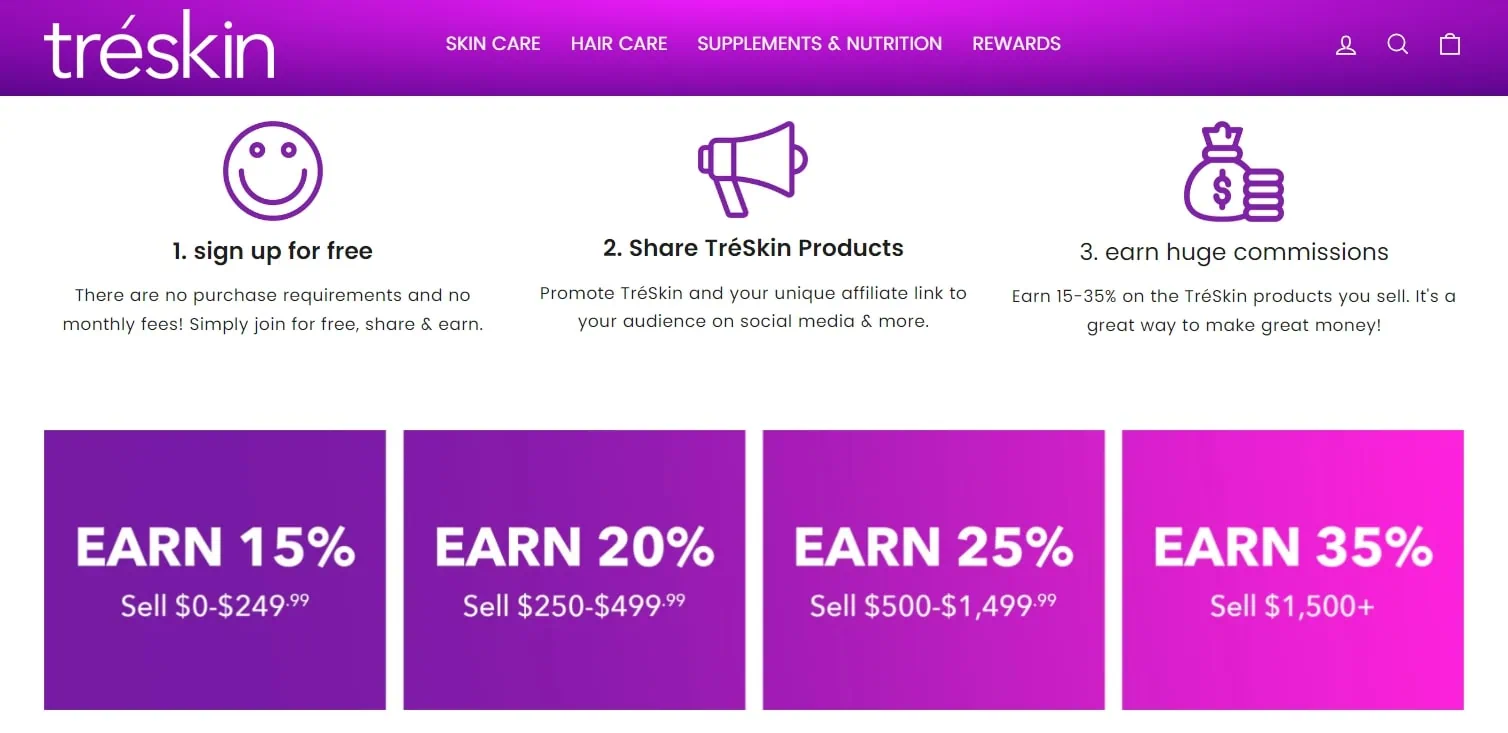 Affiliates, including beauty bloggers, who generate more sales can earn more commissions, between 15% and 35%.
Affiliates, including beauty bloggers, who generate more sales can earn more commissions, between 15% and 35%.
With such an attractive commission structure, Tréskin has captured the attention of many high-quality bloggers and influencers in the beauty niche and encourages them to sign up for its affiliate campaign.
Join 115,000+ UpPromote’s users to create dynamic commission structures that outsmart your competitors
Effective Ways To Reach Out To Top Bloggers
After having a list of ideal bloggers, it’s time to reach out and invite them to be your brand’s advocates.
But bloggers, especially the top ones, often receive a lot of messages and collaboration requests. So, you need a strategic approach to connect with them and capture their interest in your offers.
Here are some ways that you could try for your outreach plan:
Connect through social media
You may easily reach bloggers on Facebook, Instagram, or LinkedIn. Use the chat facility for direct messaging to your probable partners.
However, building a relationship beforehand could improve your chances of receiving a positive response to such a request. Start by following their social media profiles and being active with their content by liking or leaving thoughtful comments. Share their posts and tag them properly so that they notice.
That way, you show real interest in their work and make it easier for them to remember your brand name as you move on to the next step: proposing a collaboration.
For better outreach, send a tailored message. It may include:
- A brief introduction to your brand
- A recent blog post you found valuable
- An explanation of why they are a great fit for your brand
- Clear details about the collaboration offer
- The benefits they will receive by partnering with you
Start email outreach
If you have a blogger’s email address and prefer a more professional approach, you can contact them that way.
Your email should be as concise and to the point. Introduce yourself and your role briefly. Clearly state why you’re reaching out and emphasize how the collaboration benefits them and their audience.
Here’s an email template for you to use:
Dear [Name of Blogger],
I hope this email finds you well. I’m reaching out from [Your Brand/Company Name] to express how impressed we are with the quality and value of your blog posts on [Blog Topic/Niche].
We’ve been following your work closely and appreciate your deep understanding of your audience’s needs and interests. Your writing style and expertise match perfectly with our brand’s values and goals.
We are launching an exciting new initiative and believe your contribution would add immense value. We’d love to explore the possibility of collaborating with you on [specific idea/project]. Your unique insights and engaged audience make you a great fit for what we have in mind.
Looking forward to hearing from you soon!
Best regards,
[Your Name]
[Your Position]
[Your Company]
[Contact Information]
Meet bloggers in person through events
There’s nothing better than having face-to-face interactions to start a relationship. This is true for both you and potential bloggers.
As mentioned above, take the opportunity to meet and network with bloggers within your industry through events, conferences, workshops, or seminars.
For effective outreach to bloggers at events, consider doing the following things:
- If available, review the list of attendees to identify key bloggers
- Subscribe to their blogs, and follow them on social media to engage with them before the event
- Think about how you are going to present your band with potential partners impressively
- Prepare brochures, product samples, or media kits that showcase your brand
When you have a chance to talk to potential bloggers in person, ask to exchange contact information, such as emails or phone numbers, because there could be further discussions about partnership possibilities after the events.
Measure Your Program’s Success With Bloggers
Just like teaming up with any other type of affiliate, you’ll also need to closely track the performance of bloggers and make necessary improvements.
To obtain reliable data for making informed decisions, it’s important to have an accurate tracking system.
That’s where UpPromote—the top-rated affiliate app on Shopify, with a 4.9/5 rating and over 4,000 reviews—comes in. The app will help you track and measure bloggers’ effectiveness without manual tasks.
Turn on UpPromote’s powerful settings to enable multiple tracking methods & get real-time insights into bloggers’ performance.
Define your goals and KPIs
First, think about what you want to achieve when teaming up with bloggers.
Are you aiming to:
- Grow overall sales for your store?
- Increase sales of a certain product?
- Drive more traffic to your site?
To make your objectives clearer, apply the SMART model: Specific, Measurable, Achievable, Relevant, and Time-bound. For instance:
- Reach X% higher total sales next quarter by teaming up with Y new bloggers.
- Boost sales of Product A by X% next month with an exclusive deal for Y bloggers.
- Bring in X new visitors over 3 months by working with Y bloggers.
Also, you need to select KPIs that will help you measure how well you’re meeting your goals. Common KPIs for your program can include:
- Clicks and traffic: See how much traffic each blogger is driving to your website.
- Sales and revenue: Track the number of sales and the revenue generated by each blogger.
- Conversion rate: Measure the percentage of clicks that convert into actual sales.
- Average order value (AOV): Monitor the average order value from sales made through their affiliate links or coupons.
- Customer lifetime value (CLV): Assess the long-term value of customers acquired through your blogger partners.
- Return on investment (ROI): Evaluate the profitability of your affiliate program relative to its cost.
Track blogger performance
Tracking is a crucial part of running a successful affiliate marketing program. If it is done right, you will know exactly how well your partners, including bloggers, are doing and gain valuable insights to motivate them.
Using an affiliate tracking tool that automatically and accurately tracks sales is a smart way to simplify the process and keep it hassle-free.
With UpPromote, our app automatically generates unique affiliate links, making it easy for bloggers to share them in their content.
There’s more to explore beyond this. UpPromote also offers more tracking methods for your setup. You can track blogger’s sales through:
- Coupon code
- Connected customer
- Connected product/collection
Whenever a blogger brings you a sale, you can check it in the Referrals tab to see the source of this referral.
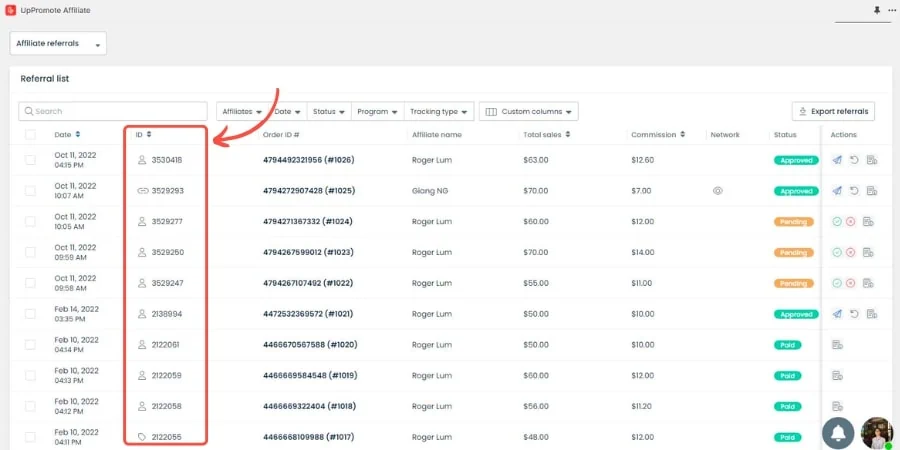
Besides that, UpPromote allows you to add UTM parameters to the affiliate link so you can track data in Google Analytics.
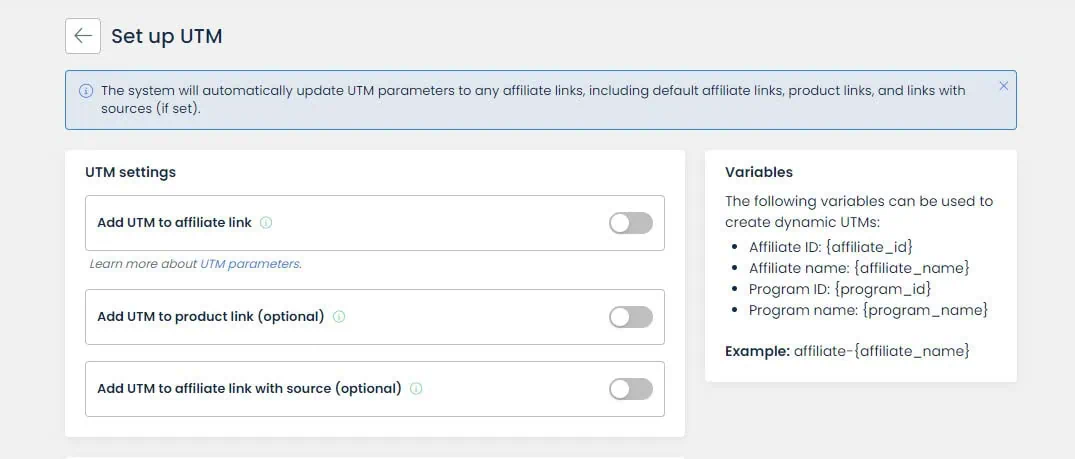
Analyze and optimize bloggers’ promotional results
Tracking blogger performance alone is not enough. The next crucial step is to analyze the data and identify what’s working and what isn’t. The main goal of this process is to optimize your affiliate program for better results.
If you use UpPromote, our system will provide you with real-time and in-depth reports on how well your partners are contributing to your program. You can view key metrics such as total affiliates, orders, sales, clicks, and commissions with various types of graphs.
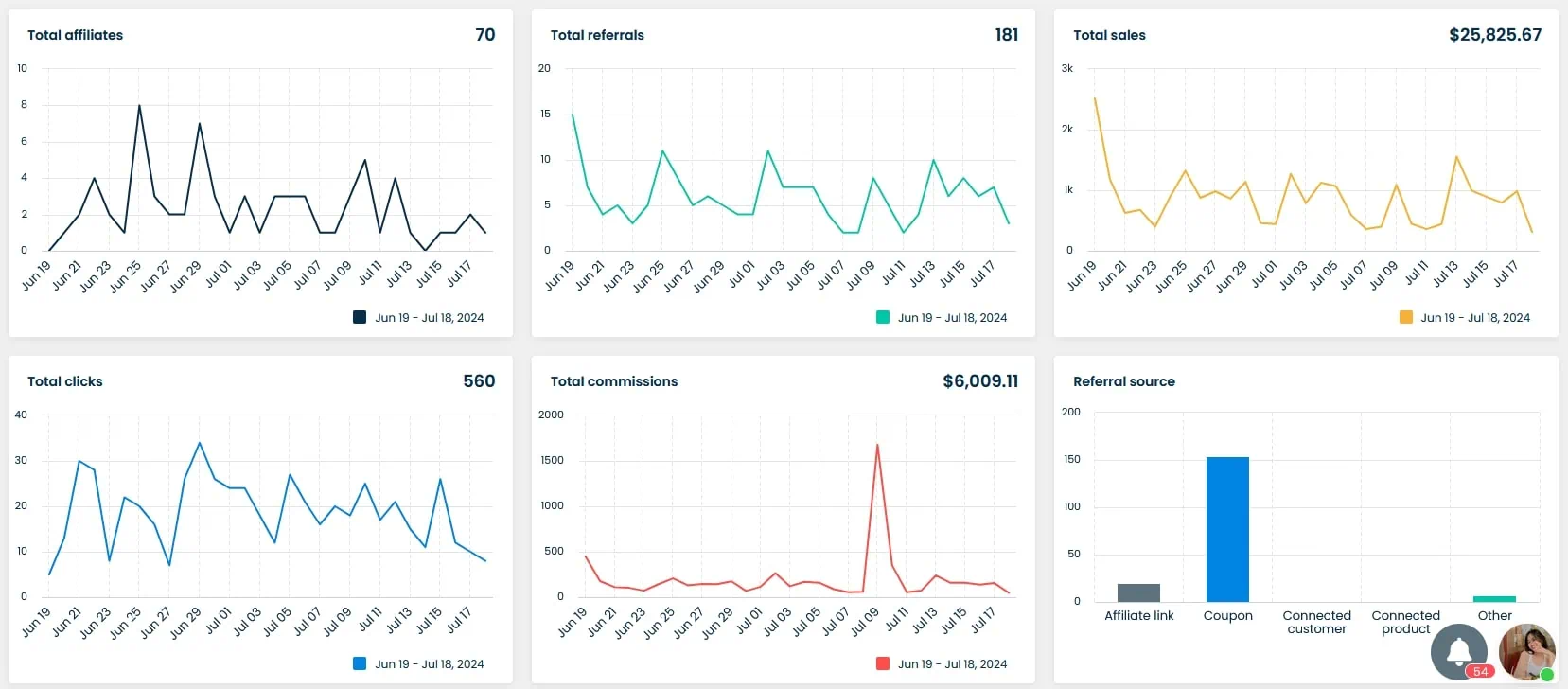
With the Top Affiliates and Product Analytics tabs, you can dive deeper into affiliate analytics to identify top-performing affiliates and determine the best-selling products.
UpPromote also lets you download these reports in various formats, such as Excel, CSV, and PDF, for easier comparison or evaluation.
From there, you can make data-driven decisions to improve your campaign, such as:
- Ask affiliates, including bloggers who missed their targets, about any issues. Offer timely support.
- Adjust rewards based on affiliate performance. This will keep your top partners engaged and motivated.
- Test different commission rates. Find the best ones to motivate your partners.
Wrapping up
Finding bloggers for your products isn’t easy, but we hope that this guide will help you understand where and how to approach them.
You can try different methods to find bloggers-from searching via Google or social networks to using affiliate networks and attending events in your niche.
Whatever you decide, always make sure to send them personalized messages showing that you are interested in working with them and that your offer will benefit them.
Once your ideal bloggers join your program, don’t forget to track and optimize their performance to get the best results and strengthen the partnerships. Consider using an affiliate tracking solution to assist you with this process.









